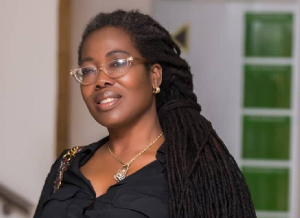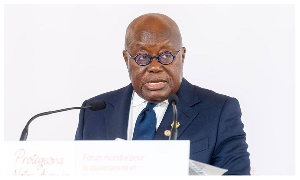Accra, June 7, GNA - Two eminent filmmakers, Mr John Akomfrah of Ghana and St. Clair Bourne of the United States of America, whose works continue to blaze the trail of Pan African filmmaking, have been honoured at the on-going Second Annual Pan-African Real Life Documentary Festival in Accra. Mr. Akomfrah was honoured for producing an impressive art work in documentary and feature-film formats, exploring racial tensions in the United Kingdom and for his work into the lives of historic American figures such as Malcolm X and Martin Luther King Jnr. His films include: The Wonderful World of Louis Armstrong, Martin Luther King - Days of Hope, Testament, Who Needs a Heart and Speak Like a Child.
Mr. Akomfrah's first film, Handsworth Songs, was awarded the prestigious British Film Institute Grierson Award for Best Documentary Film in 1987.
He is also acclaimed to have produced a wide range of innovative work which is considered to be some of the most distinctive and exciting in British film culture over the last 20 years. The filmmaker has also been a leading proponent of digital filmmaking.
St. Bourne was described as a veteran producer, director and writer of some 45 film productions, including documentaries for major media organizations and National Geographic. His documentary films include: New Orleans Brass and Langston Hughes: The dream Keeper.
Speaking at the award ceremony, Mrs Lydie Diakhate of Real Life Documentary, said the festival sought to encourage the emergence of new voices in documentary filmmaking and new scholarships. It would also serve as a platform to explore, test and promote new ways of producing good quality television documentaries cheaply. Mrs Diakhate said they sensed that enormous talent and energy were being wasted in stalled production. She said as a way to help break the logjam, they invited several filmmakers to experiment with very inexpensive production and to record their experiences.
She said they were showcasing few stories and production methods that naturally lent themselves to the low cost of production but with high quality.
Mr Kwaw Ansah, a eminent Film Producer and Director of TV Africa, identified film as a weapon that had been used to dehumanize Africans and challenged African filmmakers to use the same instrument to repair the damage.
Professor Kofi Anyidoho of African Humanities Institute Programme, University of Ghana, emphasised the critical significance of film festival in general and African film festival dedicated to the documentary in particular. He said it was justifiable in the past for non-Africans to produce documentaries about events in Africa due to the high cost of documentary production.
However, with development in technologies of film production, there was no longer any justification for Africans to leave their stories to be told by others, he added.
Documentary films to be shown include: Seven Songs for Malcolm X, by John Akomfrah; Thomas Sankara, by Balufu Bakupa Kanyinda; Black West, by St Clair Bourne; Cradle of Nigeria Liberation, by Femi Odugbemi; Searching for Taid, by Branwen Okpako and Calypso at Dirty Jim's by Pascale Obolo.
Topics to be discussed during the workshops include: Documentary Filmmaking and the Representation of Local Knowledge in Africa from Independence to the Present Moderators; The Challenges of Developing the Documentary Genre in Ghana and New Directions in Documentary Film: Story-telling, Ideology and Representation in Africa and the Diaspora.
Entertainment of Thursday, 7 June 2007
Source: GNA
















